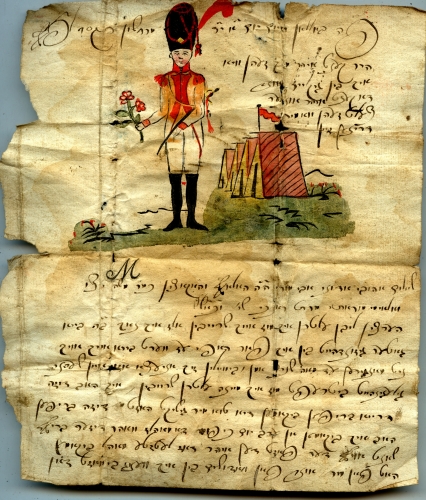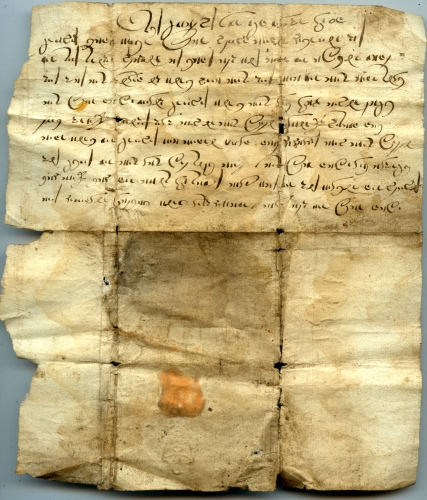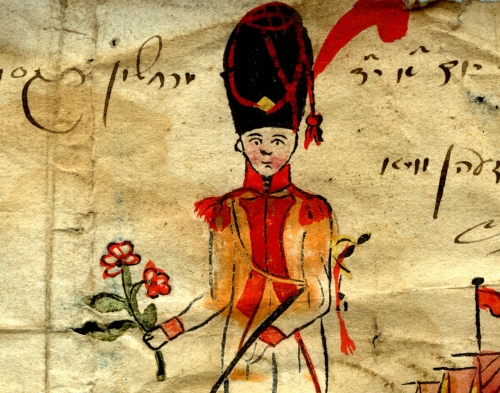The Soldier’s Letter – Letter from the Jewish Soldier Schmuel Doderer
The area of the Niederzissen congregation came under French rule after the Coalition Wars of 1794, guaranteeing equal rights to all Jews living there. This included being eligible for military service. A letter to his parents from 1807 shows that amongst those serving in the French army was Schmuel Doderer from Niederzissen. Schmuel was stationed at Boulogne-sur-Mer, then moved with his regiment all the way to Spain, where he probably died in a military hospital in late 1808. We can infer from the letter – with its Hebrew writing, Jewish date, and a mention of Yom Kippur – that Schmuel was rooted in Judaism. The letter is remarkable in its artful design, decorated with colored ink, showing a soldier carrying a saber and flowers and standing next to a military camp. The drawing of a soldier expresses Schmuel‘s pride of being allowed to serve in the French army as a Jew.
Title: Letter from the Jewish Soldier Schmuel Doderer
Date: November 15th, 1807
Material: paper, colored ink, hand drawn and handwritten
Dimensions: 19.5 x 15 cm (7.7’’ x 5.9’’)
Creator: Schmuel Doderer
Transcript of the letter (the original is written in German with Hebrew letters)
Here, Bollenheim, Sunday, the 14th Marcheschvan, 568 by the abbreviated era [November 15th, 1807] [right of the painting] Here you can see me, as I am dressed, and there you can see the tent in which we are. Shalom to my beloved father, my teacher, the much-honored Master and ruler and head, Mr. Moshe, God shall protect and save him, and my mother, Mrs. Ranchi, shall she live long and strengthen.
Dear beloved parents. I must write to you, that I am still – with divine intervention – in good health. I also hope nothing is wrong with you – you should live to be 100 – Amen. And since this is such a nice opportunity, I must write to my parents. I have received these three letters you sent to me. These letters I received on Erev Yom Kippur [the eve of the Day of Atonement, October 11th, 1807]. This letter which you last received from me was already in the mail then. Chadoschim [news] I have but few, for a common soldier is not made aware of them. And thus, we hope every day to get away from here; and if we stay here for the winter, we will endure much cold. I hope nothing more than for you to write to me about their wedding; if a lot of people attended; if he got a lot of presents. I hope my writing is no burden to you, because I think it will be for you as it is for me. You can do me no greater delight than writing to me more often. [I] remain like this, your faithful son, the humble Schmuel, son of Mr. Moshe, Niederzissen.
Further Reading:
Stürmer, Brunnhilde / Decker, Brigitte. Ein langer Weg. Die Geschichte der jüdischen Familien der Synagogengemeinde Niederzissen im Brohltal. Kultur- und Heimatverein Niederzissen e.V., Niederzissen 2017
Stürmer, Brunhilde / Decker, Brigitte. The long Way. The History of the Jewish Families of the Synagogue Congregation of Niederzissen in Brohl Vally. Kultur- und Heimatverein Niederzissen e.V., Niederzisssen 2017
Nicolas Coiffait: Sur les traces du soldat Schmul, in GenAmi Nr. 95, März 2021



